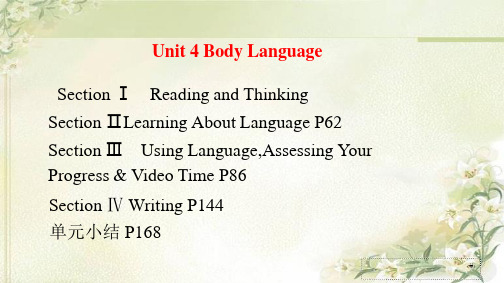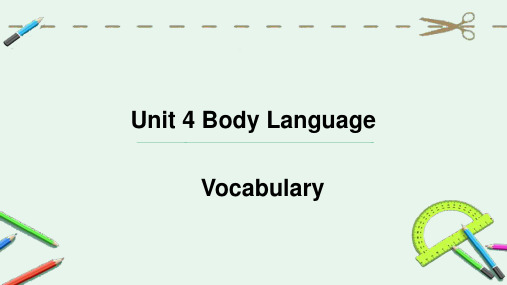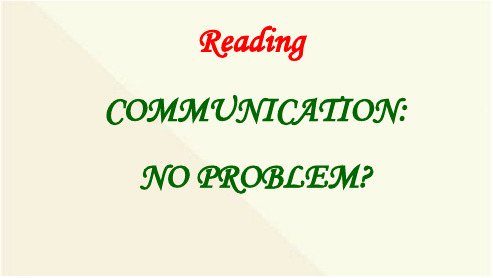高中英语:unit4-body-language课件(2)作用(新人教版必修4)
- 格式:ppt
- 大小:1.34 MB
- 文档页数:25
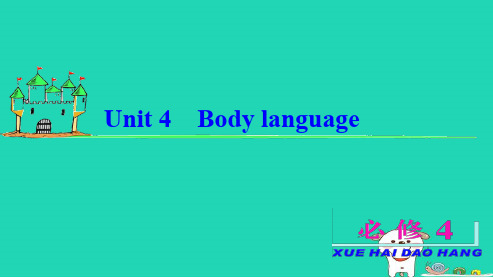
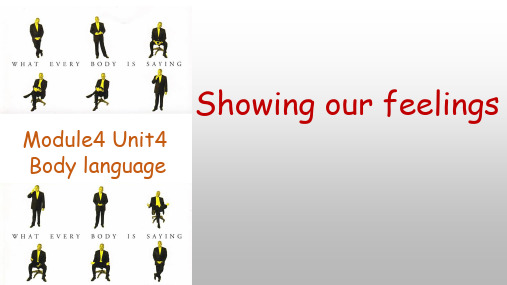

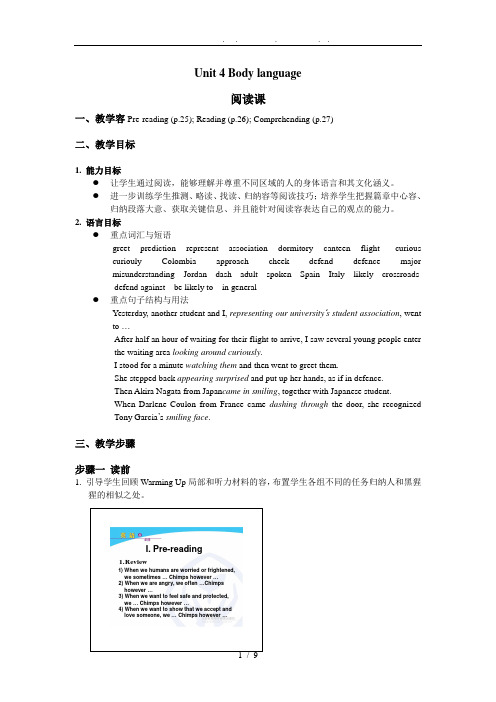
Unit 4 Body language阅读课一、教学容Pre-reading (p.25); Reading (p.26); Comprehending (p.27)二、教学目标1. 能力目标●让学生通过阅读,能够理解并尊重不同区域的人的身体语言和其文化涵义。
●进一步训练学生推测、略读、找读、归纳容等阅读技巧;培养学生把握篇章中心容、归纳段落大意、获取关键信息、并且能针对阅读容表达自己的观点的能力。
2. 语言目标●重点词汇与短语greet prediction represent association dormitory canteen flight curiouscuriouly Colombia approach cheek defend defence majormisunderstanding Jordan dash adult spoken Spain Italy likely crossroadsdefend against be likely to in general●重点句子结构与用法Yesterday, another student and I, representing our university’s student association, wentto …After half an hour of waiting for their flight to arrive, I saw several young people enterthe waiting area looking around curiously.I stood for a minute watching them and then went to greet them.She stepped back appearing surprised and put up her hands, as if in defence.Then Akira Nagata from Japan came in smiling, together with Japanese student.When Darlene Coulon from France came dashing through the door, she recognizedTony Garcia’s smiling face.三、教学步骤步骤一读前1. 引导学生回顾Warming Up局部和听力材料的容,布置学生各组不同的任务归纳人和黑猩猩的相似之处。

高一英语同步练习:必修4 Unit 4 Body Language第2课时Reading基础练习1.Scanning: Find the characters and where they are from?Character Country____________________________________________________________________________ ____________________________________________________________________________ ______________________________________2.Fast-reading : Does body language stay the same in different countries / cultures ? Why?3.Careful reading:read the text, fill the graphCountry Ways to greet each otherBritain ________________________Canada ________________________Japan ________________________Spain, Italy, South American countries________________________________France________________________________________________________________Men from Middle East and other Muslim cultures实战演练一. 英汉互译1. Yesterday, another student and I, representing our university’s studentassociation, went to the Capital International Airport to meet this year’s international students.______________________________________2.我看见几个年轻人走进了等候区,好奇地四周张望。
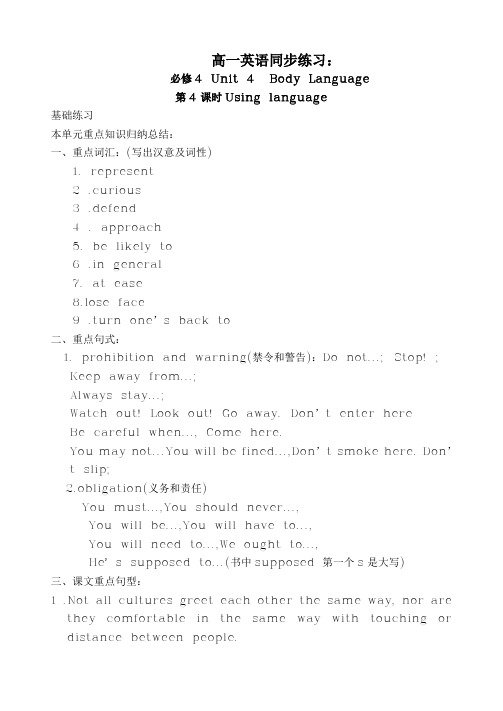
高一英语同步练习:必修4 Unit 4 Body Language第4课时Using language基础练习本单元重点知识归纳总结:一、重点词汇:(写出汉意及词性)1. represent______________2 .curious _______________3 .defend______________4 . approach ______________5. be likely to______________6 .in general______________7. at ease ______________8.lose face ______________9 .turn one’s back to______________二、重点句式:1. prohibition and warning(禁令和警告):Do not...; Stop! ;Keep away from...;Always stay...;Watch out! Look out! Go away. Don’t enter hereBe careful when..., Come here.You may not...You will be fined...,Don’t smoke here. Don’t slip;2.obligation(义务和责任)You must...,You should never...,You will be...,You will have to...,You will need to...,We ought to...,He’s supposed to...(书中supposed 第一个s是大写)三、课文重点句型:1 .Not all cultures greet each other the same way, nor arethey comfortable in the same way with touching or distance between people.1. 各种文化背景下的人互致问候的方式不尽相同,身体接触和相互间距的程度也不尽相同。

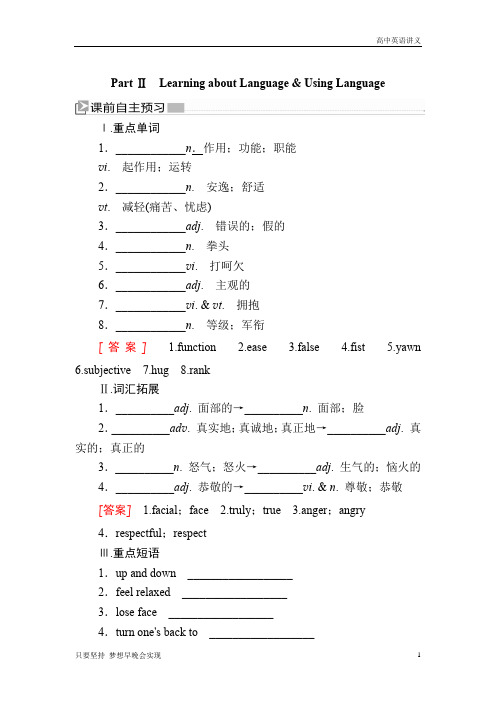
Part ⅡLearning about Language & Using LanguageⅠ.重点单词1.____________n.作用;功能;职能v i. 起作用;运转2.____________n. 安逸;舒适v t. 减轻(痛苦、忧虑)3.____________adj. 错误的;假的4.____________n. 拳头5.____________v i. 打呵欠6.____________adj. 主观的7.____________v i. & v t. 拥抱8.____________n. 等级;军衔[答案] 1.function 2.ease 3.false 4.fist 5.yawn 6.subjective7.hug8.rankⅡ.词汇拓展1.__________adj. 面部的→__________n. 面部;脸2.__________ad v. 真实地;真诚地;真正地→__________adj. 真实的;真正的3.__________n. 怒气;怒火→__________adj. 生气的;恼火的4.__________adj. 恭敬的→__________v i. & n. 尊敬;恭敬[答案] 1.facial;face 2.truly;true 3.anger;angry4.respectful;respectⅢ.重点短语1.up and down __________________2.feel relaxed __________________3.lose face __________________4.turn one's back to __________________5.nod the head __________________6.摇头__________________7.把目光从……上移开;不看__________________8.在大多数情况下__________________9.对某人尊重/尊敬__________________10.拥抱某人__________________[答案] 1.上上下下;来来回回 2.感觉放松 3.丢脸4.背对;背弃 5.点点头 6.shake the head7.look away from8.in most cases9.be respectful to sb.10.give a hug to sb.Ⅳ.重点句式1.even if 引导让步状语从句It is possible to “read” others around us,______________they do not intend for us to catch their unspoken communication.“读懂”我们周围的人(的心思)是有可能的,即使他们并不想让我们理解他们没有说出来的信息。



